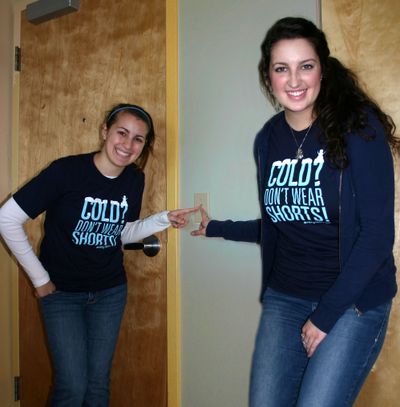Avista connecting local colleges in innovative ways
Students encourage peers to reduce consumption

You can bet coming into the new school year, saving energy isn’t that high on most college students’ “to do” lists. But toss in the word “challenge” and an opportunity to triumph over other area colleges, and it’s a good bet they’ll quickly embrace the notion of saving energy with as much fervor as a Homecoming rally.
For the second year in a row, area colleges have participated in Avista’s “Power Down, Add Up Challenge” during the month of October, which is also National Energy Awareness Month. The energy-saving competition encourages students who live on-campus to put their energy-saving thinking hats on and actively practice good habits, such as turning off the lights when they leave a room or stepping into the shower without letting the water run first.
Last year, students from Gonzaga University and North Idaho College took part, with a total of 70 participants and nine living groups. Gonzaga took home the trophy, and the program’s total energy saved for October was 11,000 kilowatt hours.
This year, these two schools have been joined by Washington State University, University of Idaho and Whitworth University, turning up the competition to 40 teams and 600 participants. For October, their total savings was 78,470 kWh.
“That’s enough energy to power over six homes for one year,” said Chris Drake, senior energy efficiency program manager at Avista.
This year, Whitworth was the big winner, saving a total of 52, 658 kWh, over two-thirds of the total energy saved across all five schools. Even more impressive, two of the three top living groups to participate were from Whitworth. Gonzaga’s Living Group, Marion Hall came in second.
“It was actually a smearing, I’d say” said Whitworth associate housing director Alan Jacob. “I was happy when I went online and found out we’d won…maybe a little smug.”
During the challenge, students were responsible for going online to Avista’s Every Little Bit web site to record which good habits out of a list of nine they practiced each day.
For each “habit” entered, a set value of kilowatt hours saved, based on an “Average Consumption by Energy Uses” table from the Department of Energy, was added to the team’s and individual schools’ totals. A kilowatt-hour is the amount of energy corresponding to a one kilowatt source of power operating for one hour.
“It’s really about educating them on behavior, rather than showing them the actual energy they saved,” said Drake. “The colleges were an area where we thought the students would really benefit from reinforcing good behavior that they hopefully will carry with them when they move out on their own and are paying their own bills.”
Each school was responsible for getting student participation in the program rolling; Avista provided T-shirts and posters and support, if needed.
“The students’ enthusiasm was high just at the mention of possible bragging rights over the other area colleges,” said Jacob. “They’ve been really into it…they’ve been tracking their progress all along and already knew they’d won when I went to congratulate them.”
Drake said students have asked why an energy company would promote the use of less energy.
“Our emphasis is on conserving existing resources…if we’re saving energy, the cheap kilowatt hour is the one you don’t use,” said Drake. “The students have made it a really fun program – embracing the honor code, really spreading the message of energy efficiency…we’re glad to be able to help them with good habits that can start the conversation of ‘How else can I save energy?’”
For more information, go to www.everylittlebit.com.